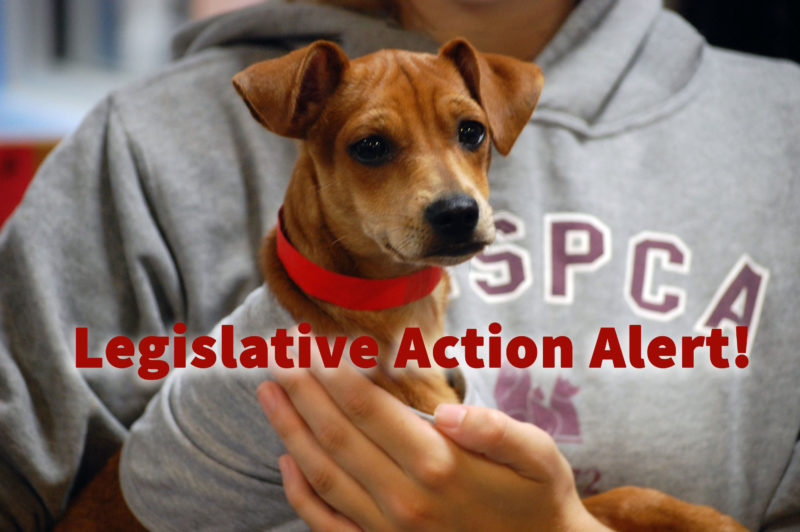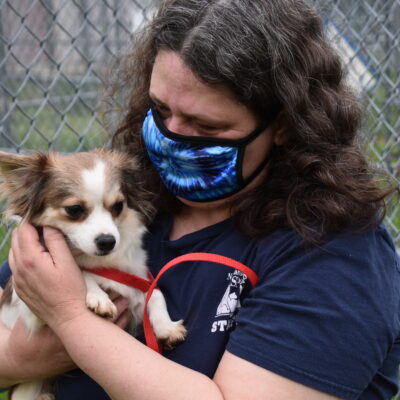
Sign up for Legislative Alerts
On Tuesday, February 25, the NH House Environment and Agriculture Committee will have a hearing for two bills that will significantly impact the lives of companion animals in our state. This is your chance to speak up for those who cannot speak for themselves and help make New Hampshire a safer and more humane place for animals. Thank you for your advocacy!
Take Action at Public Hearings on Tuesday, February 25
If you attend the public hearing, you can take action in three ways:
- Sign in and mark the “support” option. Only choose this option if you do not plan on submitting written or verbal testimony. You do not have to stay for the entire hearing.
- Submit a printed copy of written testimony. Make sure to print 20 copies of your testimony so all committee members can get one. You do not have to stay for the entire hearing.
- Fill out a pink card if you would like to provide verbal testimony. Try to keep your verbal testimony under three minutes and highlight your personal experiences with the issue. You need to stay for the full hearing if you choose this option.
If you cannot attend the public hearing, please email the committee using the information provided below. Don’t forget, it is your right as a New Hampshire citizen to advocate for state legislation, and it is the duty of state legislators to consider the views of all New Hampshire citizens.
Hearing: February 25 at 1:00 PM in Room 305-307 of the Legislative Office Building
OPPOSE House Bill 1630: Relative to pet vendors
Sponsored by Representative Howard Pearl (R-Loudon)
- Last year, legislation passed that required all pet vendors to meet the same standards of care. Any entity that sells or adopts 25 or more dogs or cats in one year is required to be licensed by the NH Department of Agriculture, Markets & Food and receive an inspection. As a licensed entity, they are be required to meet basic standards of sanitation, veterinary care, housing for animals, appropriate food, clean water and maintain records of the animals in their care.
- Since many commercial breeders do not want to be regulated, House Bill 1630 was introduced to ensure as few breeders as possible have to be licensed. To accomplish this goal, this bill will increase the number of dogs and cats that a pet vendor must transfer before they are required to be licensed and inspected. Specifically, this bill increases the licensing threshold for dogs from 25 to 35 and cats from 25 to 50. This bill also adds several exemptions so breeders who meet these higher thresholds can still avoid being licensed.
- House Bill 1630 disregards all of the suffering and costs from the many large-scale animal rescues that have recently occurred in our state due to unscrupulous breeders. Since 2016, almost 350 dogs have been rescued from cruelty at unlicensed breeding facilities. These cases have cost NH taxpayers and non-profit animal organizations over $3 million in Sullivan, Coos, Carroll, Merrimack, Cheshire, and Grafton Counties. Dogs from these cases have been held a cumulative 1,600 days waiting for an end to the criminal justice process.
- Simply put, House Bill 1630 will undo the progress we made just last year to prevent animal cruelty in our state. That is why we urge you to oppose this dangerous legislation.
Hearing: February 25 at 1:30 PM in Room 305-307 of the Legislative Office Building
SUPPORT House Bill 1388: Prohibiting the sale of cats, dogs, and rabbits in retail stores
Sponsored by Representative Katherine Rogers (D-Concord)
- House Bill 1388 will benefit New Hampshire’s animals and people by reducing the demand for puppy mill puppies, protecting consumers from misleading pet store claims, and addressing risks to public health. This bill will stop the sale of puppy mill puppies, kittens, and rabbits in pet stores and drive the pet market toward more humane sources like shelters, rescues, and responsible breeders. PLEASE NOTE: This bill will not prevent breeders from selling their animals directly to the public—this bill only impacts the retail sale of pets in brick-and-mortar pet stores.
HB 1388 Stops the Puppy Mill to Pet Store Pipeline in the Granite State
- It is well-documented that New Hampshire’s pet stores source their puppies from out-of-state puppy mills, which are inhumane commercial breeding facilities that disregard the well-being of dogs for profit. Since most people would be appalled to discover the cruel conditions in which these puppies were raised, pet store owners often lie to their customers and say their puppies come from reputable breeders.
- The truth is responsible breeders would never sell to pet stores! Responsible breeders only sell directly to the public so they can screen prospective buyers in person. Responsible breeders would never hand their puppies to a truck driver to be transported to a faraway pet store, displayed like a product, and sold to anyone with a credit card. Plus, most breed clubs discourage selling to pet stores.
HB 1388 Protects Consumers
- New Hampshire pet stores charge premium prices for puppies with baseless guarantees that puppies are healthy, socialized, and come from humane, highly regulated breeders. However, because most of these puppies were raised in unsanitary conditions, consumers often spend thousands of dollars caring for sick pet store puppies, in some cases only to suffer the heartbreak of their new pet dying. Many pet store puppies also have behavioral issues and struggle to transition from life in a cage to life in a family.
- According to the pet industry, only 4% of dogs are obtained from pet stores, so no significant impact on consumer choice will be felt. People can still adopt from a shelter or rescue or purchase a puppy from a responsible breeder who happily allows consumers to see where the puppy was bred and raised. There is no evidence that people would be driven to the internet, as many pet store purchases are impulse-driven (this is why so many pet stores are in malls) or the result of people who want to interact with a puppy before purchase.
HB 1388 Protects Public Health
- The Centers for Disease Control and Prevention (CDC) warns consumers about the risks of pet store puppies. In 2017-18, over one hundred Americans – including two in New Hampshire – were sickened with an antibiotic-resistant strain of Campylobacter causing dozens to be hospitalized. In its final report of the outbreak, the CDC stated that 95% of pet store puppies received antibiotics at, or before arriving at, a pet store. This indicates reckless overuse of these drugs and that pet stores know their puppies are likely to be sick. As one CDC official, Dr. Robert Tauxe, wrote: “The puppy story is not over – it is difficult to control with a whole system that lacks hygiene at many points and seems to use antibiotics instead.”
HB 1388 Supports Local Businesses
- The most successful pet stores—both large chains and small shops—profit from selling products and offering in-demand services. Americans spent $75 billion on their pets in 2019, and every category, including food, products, and services, saw an increase except live animal sales, which they predict will continue to decline. Pet stores with animals reported $246 in total revenue per square foot, while pet stores that sell only dry goods reported $403 per square foot.
- Pet stores can thrive by converting from the outdated and socially unacceptable business model that relies on the sale of mill puppies to a model that focuses on offering quality products and services, and hosting adoption events. Cries from some pet store owners that they need to sell puppies to stay in business are baseless, as the majority of pet stores in New Hampshire are already in compliance with this legislation because they do not sell animals.

